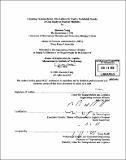Choosing transportation alternatives for highly perishable goods : a case study on nuclear medicine
Author(s)
Yang, Xiaowen, M. Eng. Massachusetts Institute of Technology
DownloadFull printable version (2.456Mb)
Other Contributors
Massachusetts Institute of Technology. Engineering Systems Division.
Advisor
Chris Caplice.
Terms of use
Metadata
Show full item recordAbstract
The transport of highly perishable goods, in particular nuclear medicine, is subject to stringent regulations. Carefully designed transport selection criteria considering available alternatives, product attributes, decay analysis, and shipping constraints may reduce the total costs. This thesis recommends a new approach to making alternative selections, leading to total cost reductions. This project was conducted with three goals in mind in partnership with a Fortune 500 healthcare company. First, it serves to develop a deeper understanding of the transport of nuclear medicine. Second, it serves to analyze whether current decision making processes can be adjusted to lower the total cost. Third, it serves to improve transportation decisions about nuclear medicine. The results demonstrate that the current operation of the partner company can be improved by ceasing to over-estimate and over-compensate decay costs by using more high-rate alternatives than needed. By minimizing total costs, the company can reduce its transportation costs by 5-10%. Note also that minimizing transportation costs alone can achieve total cost reductions, similar to minimizing total costs, although both scenarios recommend different alternative selection mixes. The embedded reason is that decay costs and transportation costs cancel out each other.
Description
Thesis (M. Eng. in Logistics)--Massachusetts Institute of Technology, Engineering Systems Division, 2006. Includes bibliographical references (leaves 55-56).
Date issued
2006Department
Massachusetts Institute of Technology. Engineering Systems DivisionPublisher
Massachusetts Institute of Technology
Keywords
Engineering Systems Division.